Business Ethics & Social Responsibility: An Analysis of Coles' Case
VerifiedAdded on 2023/06/11
|10
|2668
|286
Essay
AI Summary
This essay provides a comprehensive analysis of the business ethics and social responsibility issues surrounding Coles, an Australian retail giant, based on a recent media article. The essay outlines arguments concerning mistreatment of foreign workers, racial discrimination, and unsafe working conditions within Coles' warehouses. It explores the legal implications related to breaches of the Fair Work Act 2009 and various discrimination laws. The essay evaluates the appropriateness of ethical decisions made by Coles, contrasting them with ethical frameworks such as deontology, utilitarianism, and justice. It suggests improvements in organizational policies, training, and adherence to government regulations to foster a more ethical and equitable workplace environment. The study concludes by emphasizing the importance of ethical conduct for organizational reputation and employee well-being.
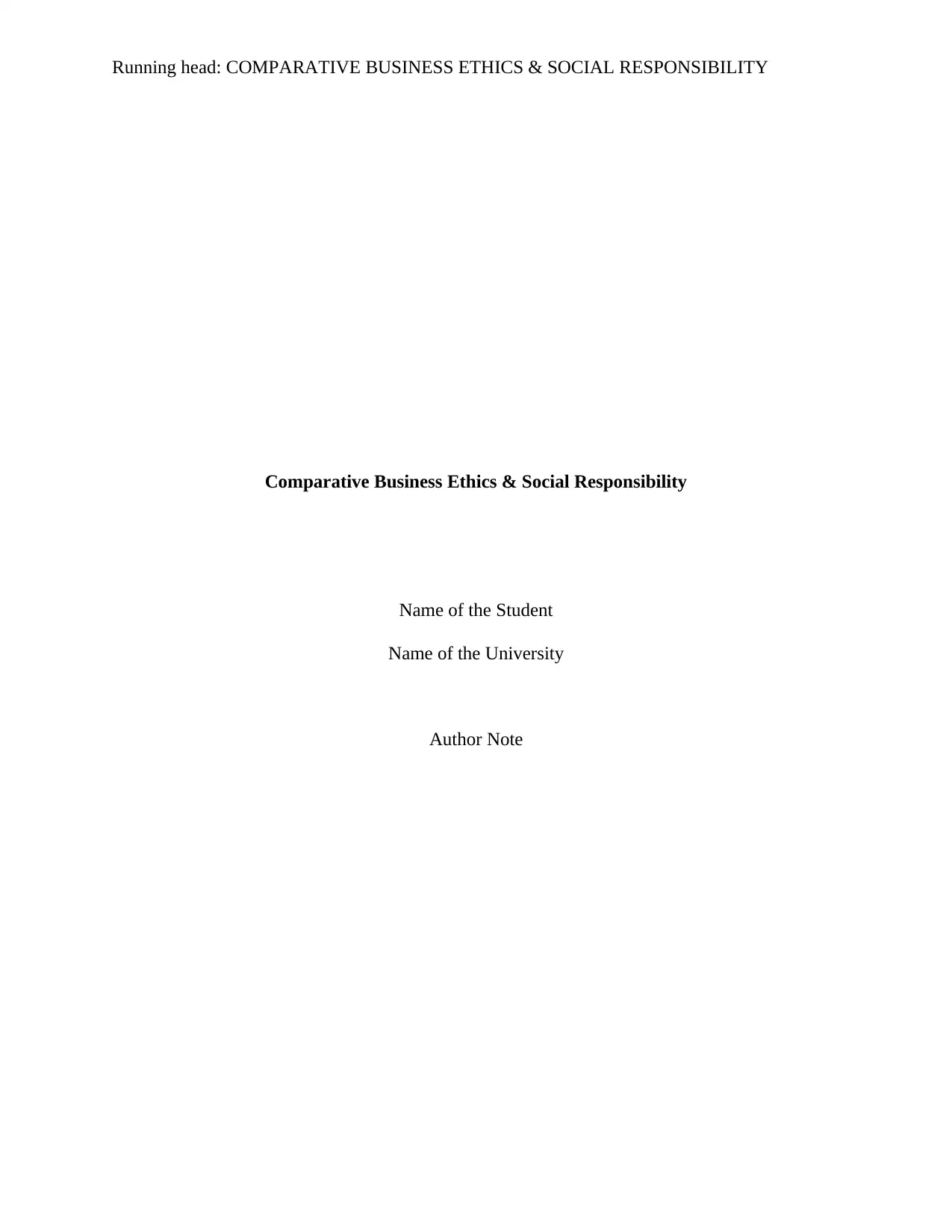
Running head: COMPARATIVE BUSINESS ETHICS & SOCIAL RESPONSIBILITY
Comparative Business Ethics & Social Responsibility
Name of the Student
Name of the University
Author Note
Comparative Business Ethics & Social Responsibility
Name of the Student
Name of the University
Author Note
Paraphrase This Document
Need a fresh take? Get an instant paraphrase of this document with our AI Paraphraser
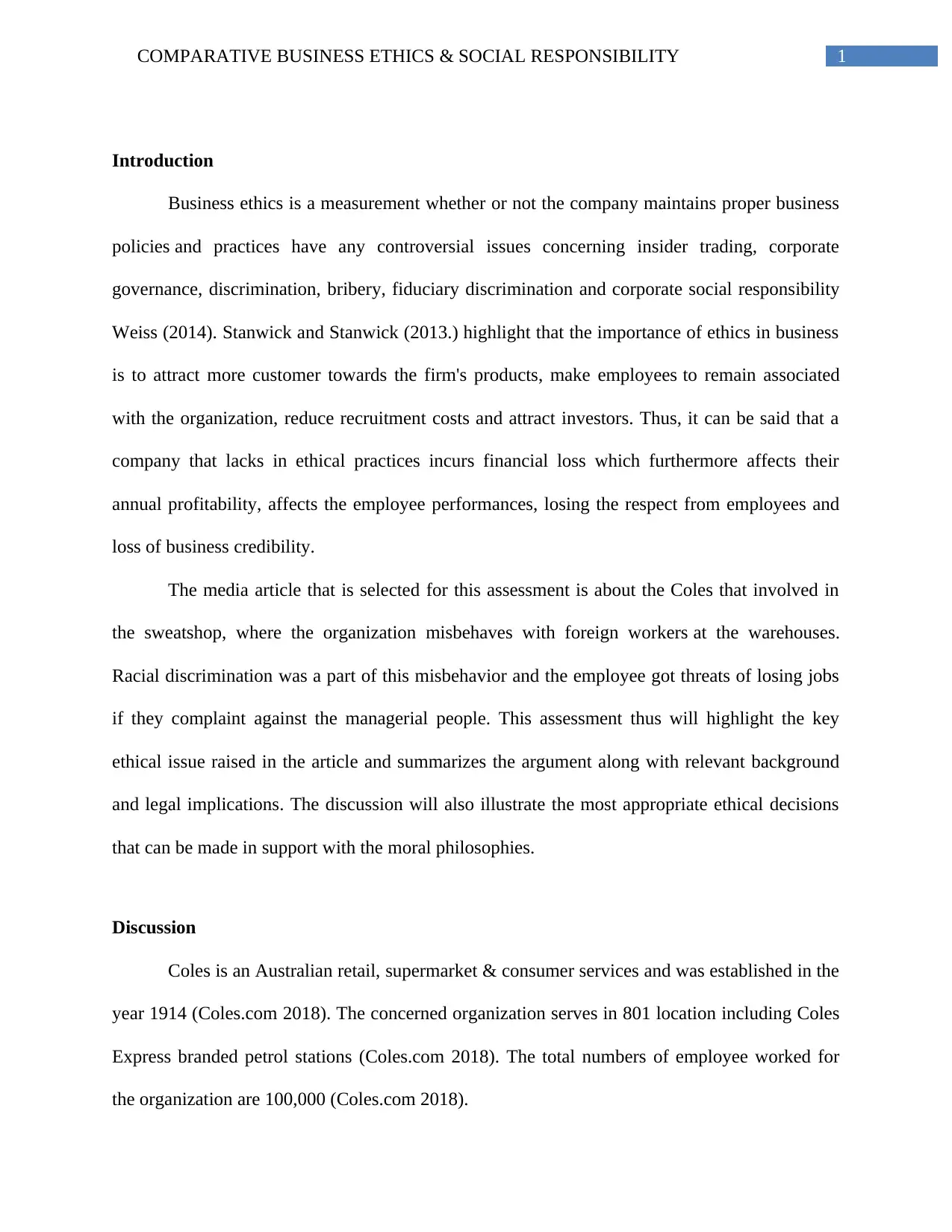
1COMPARATIVE BUSINESS ETHICS & SOCIAL RESPONSIBILITY
Introduction
Business ethics is a measurement whether or not the company maintains proper business
policies and practices have any controversial issues concerning insider trading, corporate
governance, discrimination, bribery, fiduciary discrimination and corporate social responsibility
Weiss (2014). Stanwick and Stanwick (2013.) highlight that the importance of ethics in business
is to attract more customer towards the firm's products, make employees to remain associated
with the organization, reduce recruitment costs and attract investors. Thus, it can be said that a
company that lacks in ethical practices incurs financial loss which furthermore affects their
annual profitability, affects the employee performances, losing the respect from employees and
loss of business credibility.
The media article that is selected for this assessment is about the Coles that involved in
the sweatshop, where the organization misbehaves with foreign workers at the warehouses.
Racial discrimination was a part of this misbehavior and the employee got threats of losing jobs
if they complaint against the managerial people. This assessment thus will highlight the key
ethical issue raised in the article and summarizes the argument along with relevant background
and legal implications. The discussion will also illustrate the most appropriate ethical decisions
that can be made in support with the moral philosophies.
Discussion
Coles is an Australian retail, supermarket & consumer services and was established in the
year 1914 (Coles.com 2018). The concerned organization serves in 801 location including Coles
Express branded petrol stations (Coles.com 2018). The total numbers of employee worked for
the organization are 100,000 (Coles.com 2018).
Introduction
Business ethics is a measurement whether or not the company maintains proper business
policies and practices have any controversial issues concerning insider trading, corporate
governance, discrimination, bribery, fiduciary discrimination and corporate social responsibility
Weiss (2014). Stanwick and Stanwick (2013.) highlight that the importance of ethics in business
is to attract more customer towards the firm's products, make employees to remain associated
with the organization, reduce recruitment costs and attract investors. Thus, it can be said that a
company that lacks in ethical practices incurs financial loss which furthermore affects their
annual profitability, affects the employee performances, losing the respect from employees and
loss of business credibility.
The media article that is selected for this assessment is about the Coles that involved in
the sweatshop, where the organization misbehaves with foreign workers at the warehouses.
Racial discrimination was a part of this misbehavior and the employee got threats of losing jobs
if they complaint against the managerial people. This assessment thus will highlight the key
ethical issue raised in the article and summarizes the argument along with relevant background
and legal implications. The discussion will also illustrate the most appropriate ethical decisions
that can be made in support with the moral philosophies.
Discussion
Coles is an Australian retail, supermarket & consumer services and was established in the
year 1914 (Coles.com 2018). The concerned organization serves in 801 location including Coles
Express branded petrol stations (Coles.com 2018). The total numbers of employee worked for
the organization are 100,000 (Coles.com 2018).
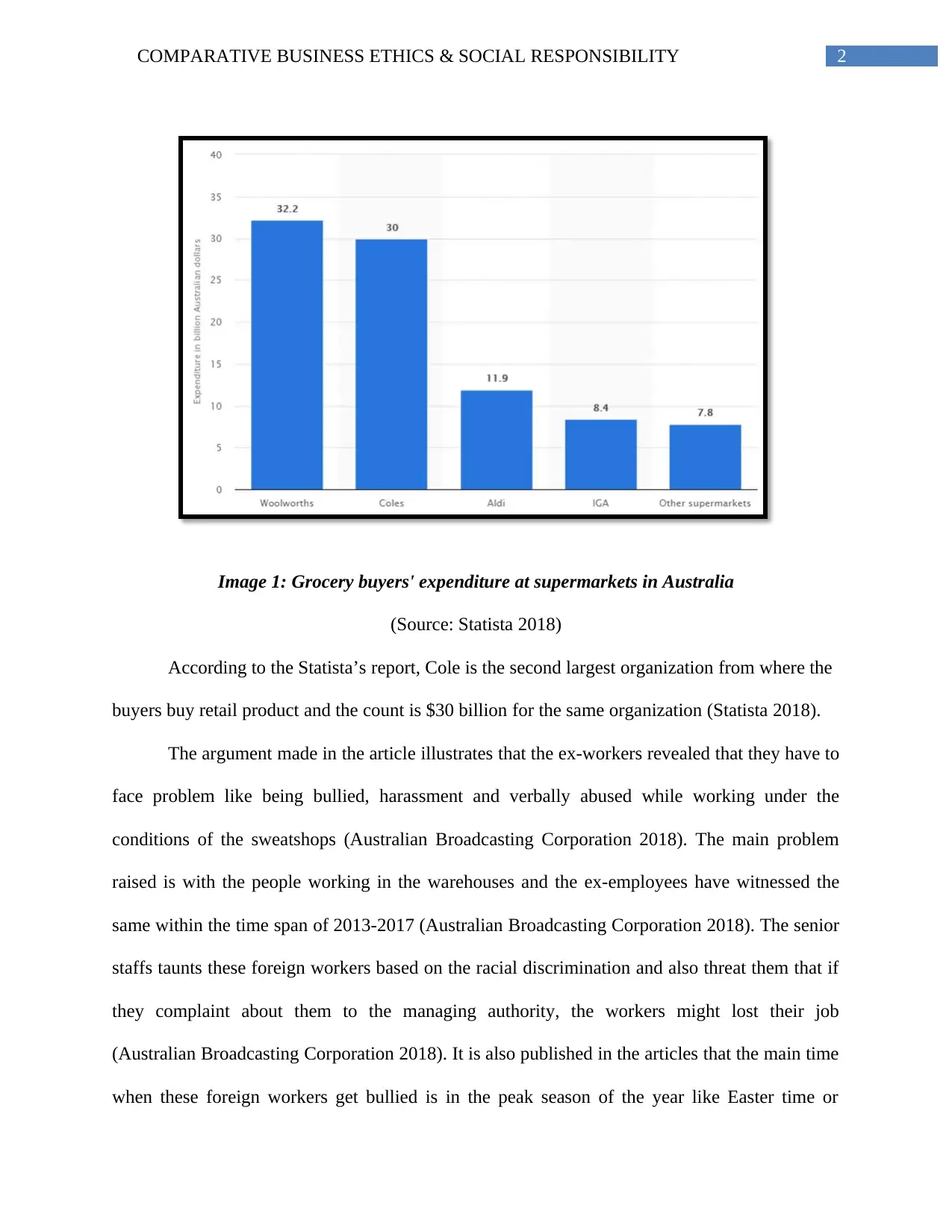
2COMPARATIVE BUSINESS ETHICS & SOCIAL RESPONSIBILITY
Image 1: Grocery buyers' expenditure at supermarkets in Australia
(Source: Statista 2018)
According to the Statista’s report, Cole is the second largest organization from where the
buyers buy retail product and the count is $30 billion for the same organization (Statista 2018).
The argument made in the article illustrates that the ex-workers revealed that they have to
face problem like being bullied, harassment and verbally abused while working under the
conditions of the sweatshops (Australian Broadcasting Corporation 2018). The main problem
raised is with the people working in the warehouses and the ex-employees have witnessed the
same within the time span of 2013-2017 (Australian Broadcasting Corporation 2018). The senior
staffs taunts these foreign workers based on the racial discrimination and also threat them that if
they complaint about them to the managing authority, the workers might lost their job
(Australian Broadcasting Corporation 2018). It is also published in the articles that the main time
when these foreign workers get bullied is in the peak season of the year like Easter time or
Image 1: Grocery buyers' expenditure at supermarkets in Australia
(Source: Statista 2018)
According to the Statista’s report, Cole is the second largest organization from where the
buyers buy retail product and the count is $30 billion for the same organization (Statista 2018).
The argument made in the article illustrates that the ex-workers revealed that they have to
face problem like being bullied, harassment and verbally abused while working under the
conditions of the sweatshops (Australian Broadcasting Corporation 2018). The main problem
raised is with the people working in the warehouses and the ex-employees have witnessed the
same within the time span of 2013-2017 (Australian Broadcasting Corporation 2018). The senior
staffs taunts these foreign workers based on the racial discrimination and also threat them that if
they complaint about them to the managing authority, the workers might lost their job
(Australian Broadcasting Corporation 2018). It is also published in the articles that the main time
when these foreign workers get bullied is in the peak season of the year like Easter time or
⊘ This is a preview!⊘
Do you want full access?
Subscribe today to unlock all pages.

Trusted by 1+ million students worldwide
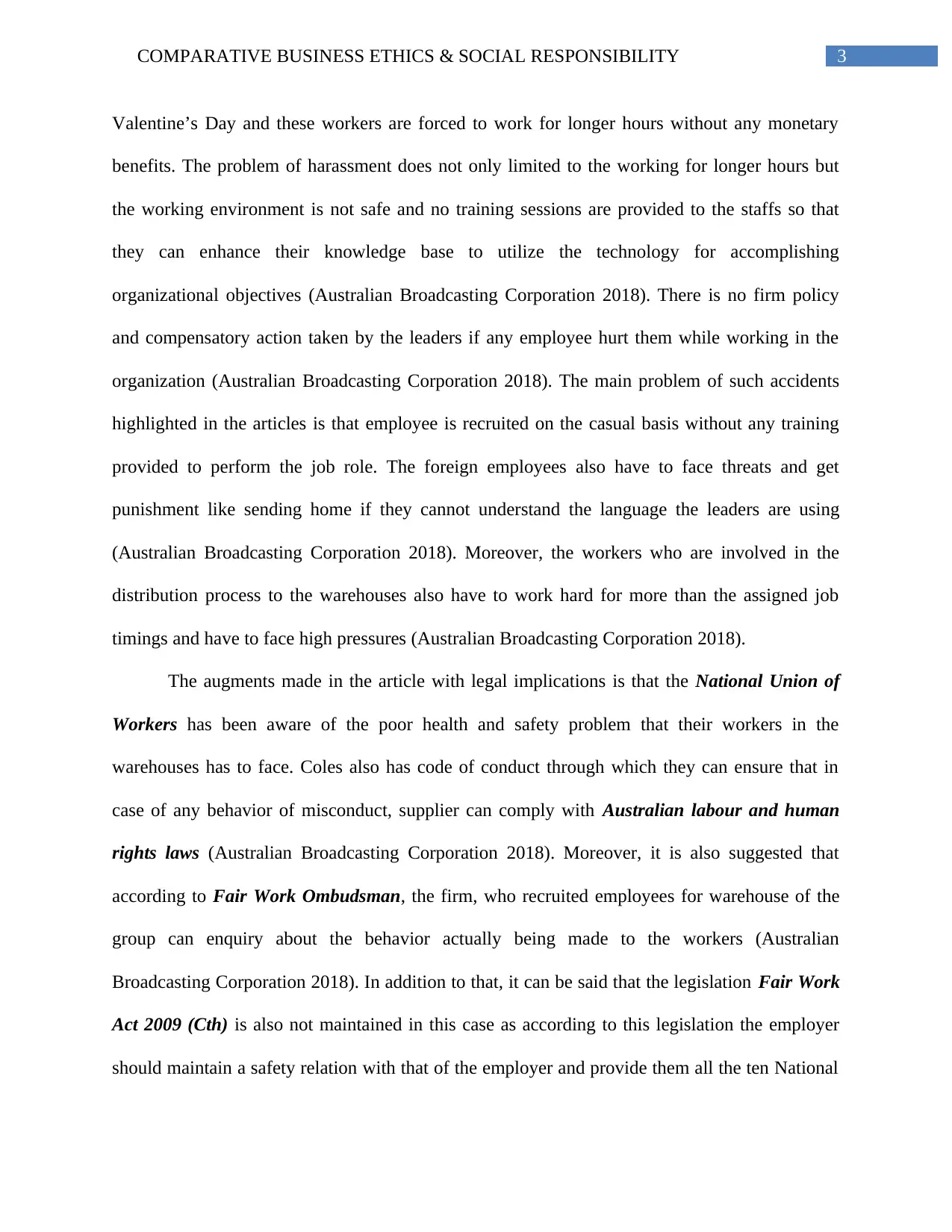
3COMPARATIVE BUSINESS ETHICS & SOCIAL RESPONSIBILITY
Valentine’s Day and these workers are forced to work for longer hours without any monetary
benefits. The problem of harassment does not only limited to the working for longer hours but
the working environment is not safe and no training sessions are provided to the staffs so that
they can enhance their knowledge base to utilize the technology for accomplishing
organizational objectives (Australian Broadcasting Corporation 2018). There is no firm policy
and compensatory action taken by the leaders if any employee hurt them while working in the
organization (Australian Broadcasting Corporation 2018). The main problem of such accidents
highlighted in the articles is that employee is recruited on the casual basis without any training
provided to perform the job role. The foreign employees also have to face threats and get
punishment like sending home if they cannot understand the language the leaders are using
(Australian Broadcasting Corporation 2018). Moreover, the workers who are involved in the
distribution process to the warehouses also have to work hard for more than the assigned job
timings and have to face high pressures (Australian Broadcasting Corporation 2018).
The augments made in the article with legal implications is that the National Union of
Workers has been aware of the poor health and safety problem that their workers in the
warehouses has to face. Coles also has code of conduct through which they can ensure that in
case of any behavior of misconduct, supplier can comply with Australian labour and human
rights laws (Australian Broadcasting Corporation 2018). Moreover, it is also suggested that
according to Fair Work Ombudsman, the firm, who recruited employees for warehouse of the
group can enquiry about the behavior actually being made to the workers (Australian
Broadcasting Corporation 2018). In addition to that, it can be said that the legislation Fair Work
Act 2009 (Cth) is also not maintained in this case as according to this legislation the employer
should maintain a safety relation with that of the employer and provide them all the ten National
Valentine’s Day and these workers are forced to work for longer hours without any monetary
benefits. The problem of harassment does not only limited to the working for longer hours but
the working environment is not safe and no training sessions are provided to the staffs so that
they can enhance their knowledge base to utilize the technology for accomplishing
organizational objectives (Australian Broadcasting Corporation 2018). There is no firm policy
and compensatory action taken by the leaders if any employee hurt them while working in the
organization (Australian Broadcasting Corporation 2018). The main problem of such accidents
highlighted in the articles is that employee is recruited on the casual basis without any training
provided to perform the job role. The foreign employees also have to face threats and get
punishment like sending home if they cannot understand the language the leaders are using
(Australian Broadcasting Corporation 2018). Moreover, the workers who are involved in the
distribution process to the warehouses also have to work hard for more than the assigned job
timings and have to face high pressures (Australian Broadcasting Corporation 2018).
The augments made in the article with legal implications is that the National Union of
Workers has been aware of the poor health and safety problem that their workers in the
warehouses has to face. Coles also has code of conduct through which they can ensure that in
case of any behavior of misconduct, supplier can comply with Australian labour and human
rights laws (Australian Broadcasting Corporation 2018). Moreover, it is also suggested that
according to Fair Work Ombudsman, the firm, who recruited employees for warehouse of the
group can enquiry about the behavior actually being made to the workers (Australian
Broadcasting Corporation 2018). In addition to that, it can be said that the legislation Fair Work
Act 2009 (Cth) is also not maintained in this case as according to this legislation the employer
should maintain a safety relation with that of the employer and provide them all the ten National
Paraphrase This Document
Need a fresh take? Get an instant paraphrase of this document with our AI Paraphraser
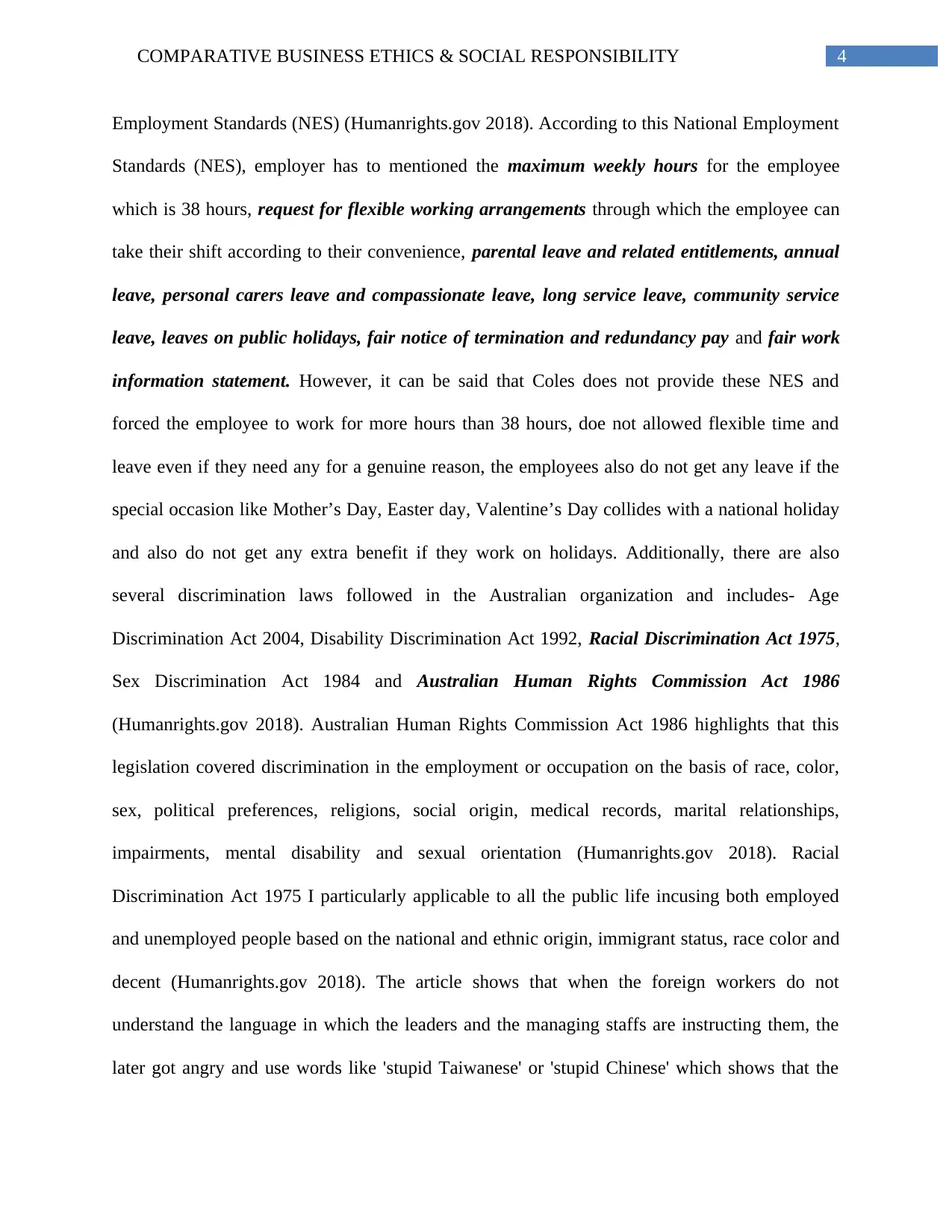
4COMPARATIVE BUSINESS ETHICS & SOCIAL RESPONSIBILITY
Employment Standards (NES) (Humanrights.gov 2018). According to this National Employment
Standards (NES), employer has to mentioned the maximum weekly hours for the employee
which is 38 hours, request for flexible working arrangements through which the employee can
take their shift according to their convenience, parental leave and related entitlements, annual
leave, personal carers leave and compassionate leave, long service leave, community service
leave, leaves on public holidays, fair notice of termination and redundancy pay and fair work
information statement. However, it can be said that Coles does not provide these NES and
forced the employee to work for more hours than 38 hours, doe not allowed flexible time and
leave even if they need any for a genuine reason, the employees also do not get any leave if the
special occasion like Mother’s Day, Easter day, Valentine’s Day collides with a national holiday
and also do not get any extra benefit if they work on holidays. Additionally, there are also
several discrimination laws followed in the Australian organization and includes- Age
Discrimination Act 2004, Disability Discrimination Act 1992, Racial Discrimination Act 1975,
Sex Discrimination Act 1984 and Australian Human Rights Commission Act 1986
(Humanrights.gov 2018). Australian Human Rights Commission Act 1986 highlights that this
legislation covered discrimination in the employment or occupation on the basis of race, color,
sex, political preferences, religions, social origin, medical records, marital relationships,
impairments, mental disability and sexual orientation (Humanrights.gov 2018). Racial
Discrimination Act 1975 I particularly applicable to all the public life incusing both employed
and unemployed people based on the national and ethnic origin, immigrant status, race color and
decent (Humanrights.gov 2018). The article shows that when the foreign workers do not
understand the language in which the leaders and the managing staffs are instructing them, the
later got angry and use words like 'stupid Taiwanese' or 'stupid Chinese' which shows that the
Employment Standards (NES) (Humanrights.gov 2018). According to this National Employment
Standards (NES), employer has to mentioned the maximum weekly hours for the employee
which is 38 hours, request for flexible working arrangements through which the employee can
take their shift according to their convenience, parental leave and related entitlements, annual
leave, personal carers leave and compassionate leave, long service leave, community service
leave, leaves on public holidays, fair notice of termination and redundancy pay and fair work
information statement. However, it can be said that Coles does not provide these NES and
forced the employee to work for more hours than 38 hours, doe not allowed flexible time and
leave even if they need any for a genuine reason, the employees also do not get any leave if the
special occasion like Mother’s Day, Easter day, Valentine’s Day collides with a national holiday
and also do not get any extra benefit if they work on holidays. Additionally, there are also
several discrimination laws followed in the Australian organization and includes- Age
Discrimination Act 2004, Disability Discrimination Act 1992, Racial Discrimination Act 1975,
Sex Discrimination Act 1984 and Australian Human Rights Commission Act 1986
(Humanrights.gov 2018). Australian Human Rights Commission Act 1986 highlights that this
legislation covered discrimination in the employment or occupation on the basis of race, color,
sex, political preferences, religions, social origin, medical records, marital relationships,
impairments, mental disability and sexual orientation (Humanrights.gov 2018). Racial
Discrimination Act 1975 I particularly applicable to all the public life incusing both employed
and unemployed people based on the national and ethnic origin, immigrant status, race color and
decent (Humanrights.gov 2018). The article shows that when the foreign workers do not
understand the language in which the leaders and the managing staffs are instructing them, the
later got angry and use words like 'stupid Taiwanese' or 'stupid Chinese' which shows that the
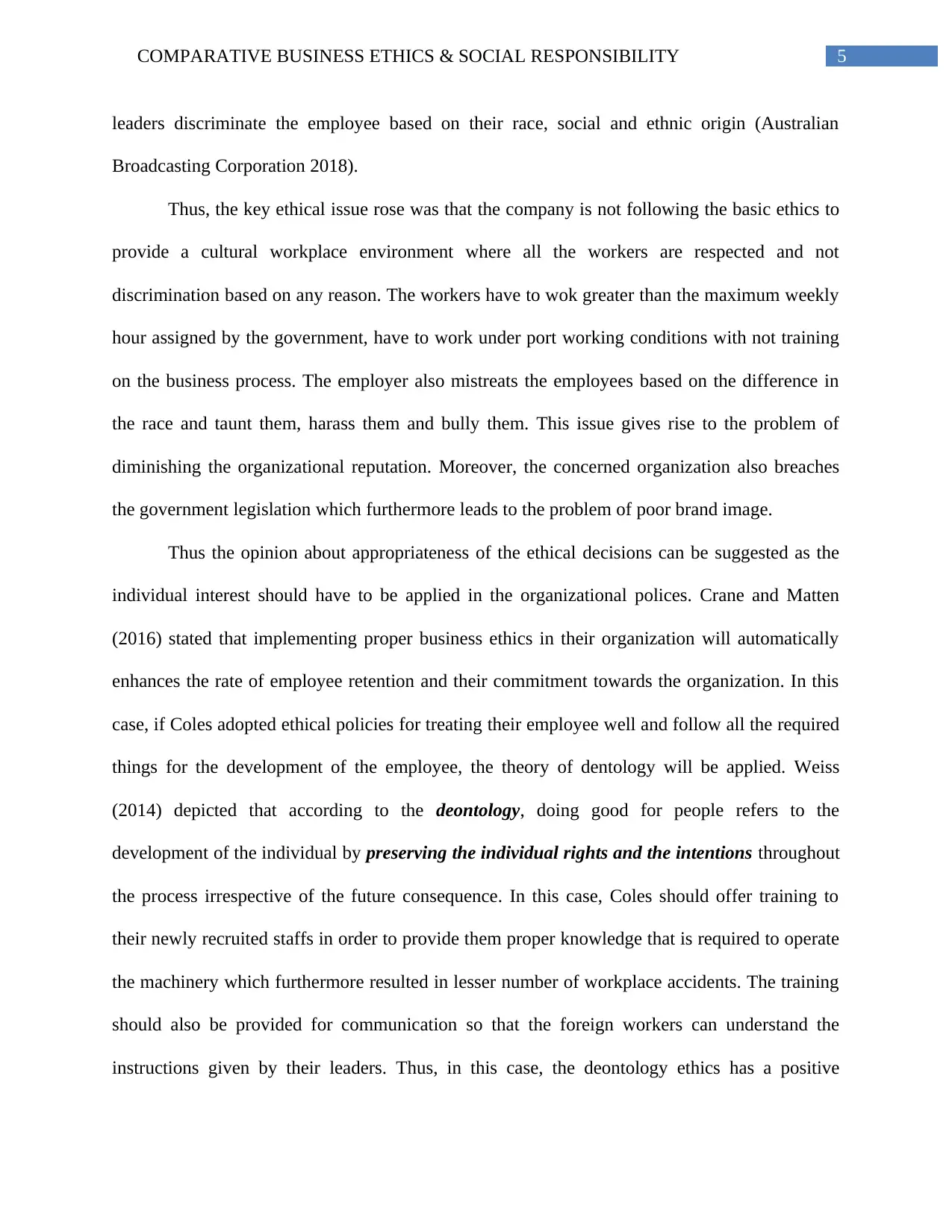
5COMPARATIVE BUSINESS ETHICS & SOCIAL RESPONSIBILITY
leaders discriminate the employee based on their race, social and ethnic origin (Australian
Broadcasting Corporation 2018).
Thus, the key ethical issue rose was that the company is not following the basic ethics to
provide a cultural workplace environment where all the workers are respected and not
discrimination based on any reason. The workers have to wok greater than the maximum weekly
hour assigned by the government, have to work under port working conditions with not training
on the business process. The employer also mistreats the employees based on the difference in
the race and taunt them, harass them and bully them. This issue gives rise to the problem of
diminishing the organizational reputation. Moreover, the concerned organization also breaches
the government legislation which furthermore leads to the problem of poor brand image.
Thus the opinion about appropriateness of the ethical decisions can be suggested as the
individual interest should have to be applied in the organizational polices. Crane and Matten
(2016) stated that implementing proper business ethics in their organization will automatically
enhances the rate of employee retention and their commitment towards the organization. In this
case, if Coles adopted ethical policies for treating their employee well and follow all the required
things for the development of the employee, the theory of dentology will be applied. Weiss
(2014) depicted that according to the deontology, doing good for people refers to the
development of the individual by preserving the individual rights and the intentions throughout
the process irrespective of the future consequence. In this case, Coles should offer training to
their newly recruited staffs in order to provide them proper knowledge that is required to operate
the machinery which furthermore resulted in lesser number of workplace accidents. The training
should also be provided for communication so that the foreign workers can understand the
instructions given by their leaders. Thus, in this case, the deontology ethics has a positive
leaders discriminate the employee based on their race, social and ethnic origin (Australian
Broadcasting Corporation 2018).
Thus, the key ethical issue rose was that the company is not following the basic ethics to
provide a cultural workplace environment where all the workers are respected and not
discrimination based on any reason. The workers have to wok greater than the maximum weekly
hour assigned by the government, have to work under port working conditions with not training
on the business process. The employer also mistreats the employees based on the difference in
the race and taunt them, harass them and bully them. This issue gives rise to the problem of
diminishing the organizational reputation. Moreover, the concerned organization also breaches
the government legislation which furthermore leads to the problem of poor brand image.
Thus the opinion about appropriateness of the ethical decisions can be suggested as the
individual interest should have to be applied in the organizational polices. Crane and Matten
(2016) stated that implementing proper business ethics in their organization will automatically
enhances the rate of employee retention and their commitment towards the organization. In this
case, if Coles adopted ethical policies for treating their employee well and follow all the required
things for the development of the employee, the theory of dentology will be applied. Weiss
(2014) depicted that according to the deontology, doing good for people refers to the
development of the individual by preserving the individual rights and the intentions throughout
the process irrespective of the future consequence. In this case, Coles should offer training to
their newly recruited staffs in order to provide them proper knowledge that is required to operate
the machinery which furthermore resulted in lesser number of workplace accidents. The training
should also be provided for communication so that the foreign workers can understand the
instructions given by their leaders. Thus, in this case, the deontology ethics has a positive
⊘ This is a preview!⊘
Do you want full access?
Subscribe today to unlock all pages.

Trusted by 1+ million students worldwide
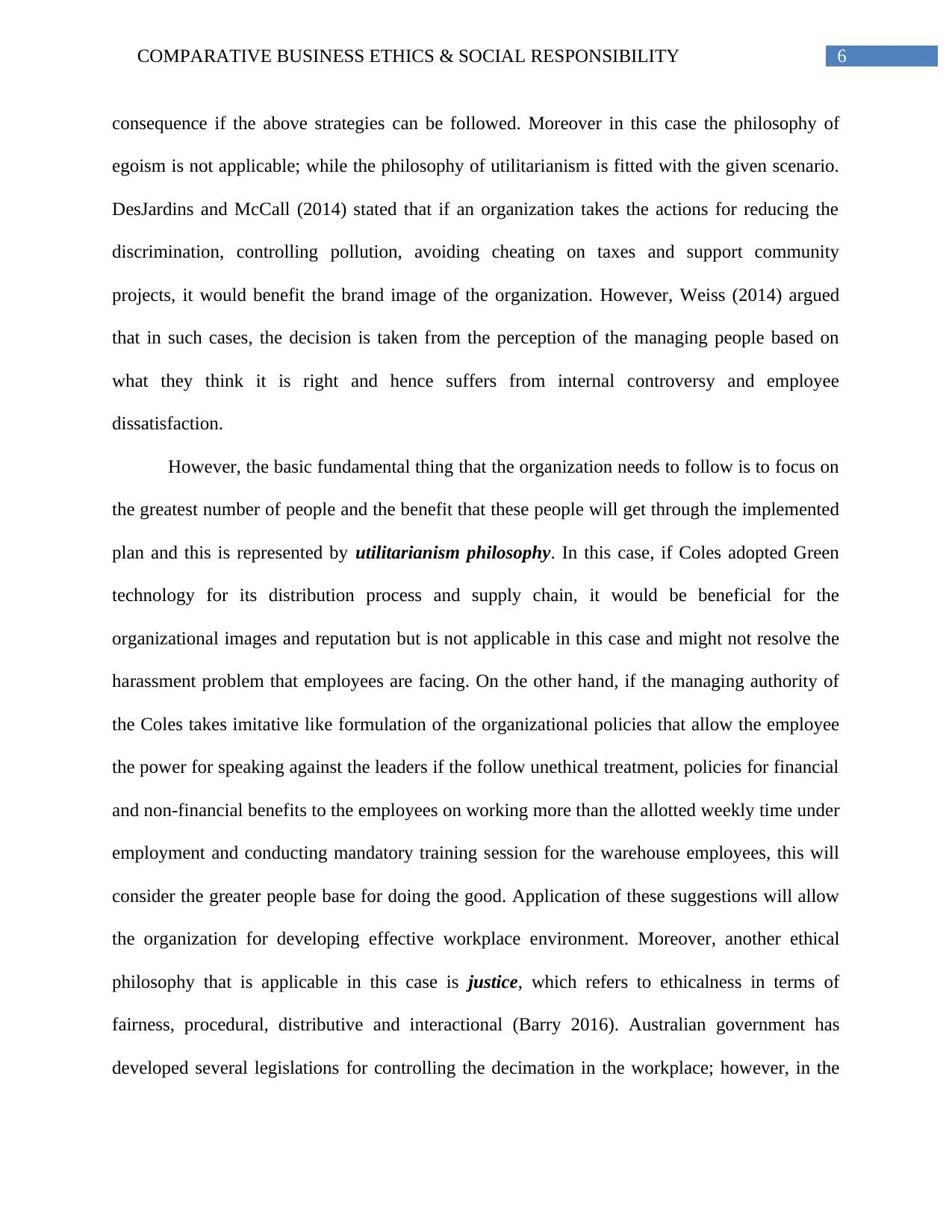
6COMPARATIVE BUSINESS ETHICS & SOCIAL RESPONSIBILITY
consequence if the above strategies can be followed. Moreover in this case the philosophy of
egoism is not applicable; while the philosophy of utilitarianism is fitted with the given scenario.
DesJardins and McCall (2014) stated that if an organization takes the actions for reducing the
discrimination, controlling pollution, avoiding cheating on taxes and support community
projects, it would benefit the brand image of the organization. However, Weiss (2014) argued
that in such cases, the decision is taken from the perception of the managing people based on
what they think it is right and hence suffers from internal controversy and employee
dissatisfaction.
However, the basic fundamental thing that the organization needs to follow is to focus on
the greatest number of people and the benefit that these people will get through the implemented
plan and this is represented by utilitarianism philosophy. In this case, if Coles adopted Green
technology for its distribution process and supply chain, it would be beneficial for the
organizational images and reputation but is not applicable in this case and might not resolve the
harassment problem that employees are facing. On the other hand, if the managing authority of
the Coles takes imitative like formulation of the organizational policies that allow the employee
the power for speaking against the leaders if the follow unethical treatment, policies for financial
and non-financial benefits to the employees on working more than the allotted weekly time under
employment and conducting mandatory training session for the warehouse employees, this will
consider the greater people base for doing the good. Application of these suggestions will allow
the organization for developing effective workplace environment. Moreover, another ethical
philosophy that is applicable in this case is justice, which refers to ethicalness in terms of
fairness, procedural, distributive and interactional (Barry 2016). Australian government has
developed several legislations for controlling the decimation in the workplace; however, in the
consequence if the above strategies can be followed. Moreover in this case the philosophy of
egoism is not applicable; while the philosophy of utilitarianism is fitted with the given scenario.
DesJardins and McCall (2014) stated that if an organization takes the actions for reducing the
discrimination, controlling pollution, avoiding cheating on taxes and support community
projects, it would benefit the brand image of the organization. However, Weiss (2014) argued
that in such cases, the decision is taken from the perception of the managing people based on
what they think it is right and hence suffers from internal controversy and employee
dissatisfaction.
However, the basic fundamental thing that the organization needs to follow is to focus on
the greatest number of people and the benefit that these people will get through the implemented
plan and this is represented by utilitarianism philosophy. In this case, if Coles adopted Green
technology for its distribution process and supply chain, it would be beneficial for the
organizational images and reputation but is not applicable in this case and might not resolve the
harassment problem that employees are facing. On the other hand, if the managing authority of
the Coles takes imitative like formulation of the organizational policies that allow the employee
the power for speaking against the leaders if the follow unethical treatment, policies for financial
and non-financial benefits to the employees on working more than the allotted weekly time under
employment and conducting mandatory training session for the warehouse employees, this will
consider the greater people base for doing the good. Application of these suggestions will allow
the organization for developing effective workplace environment. Moreover, another ethical
philosophy that is applicable in this case is justice, which refers to ethicalness in terms of
fairness, procedural, distributive and interactional (Barry 2016). Australian government has
developed several legislations for controlling the decimation in the workplace; however, in the
Paraphrase This Document
Need a fresh take? Get an instant paraphrase of this document with our AI Paraphraser
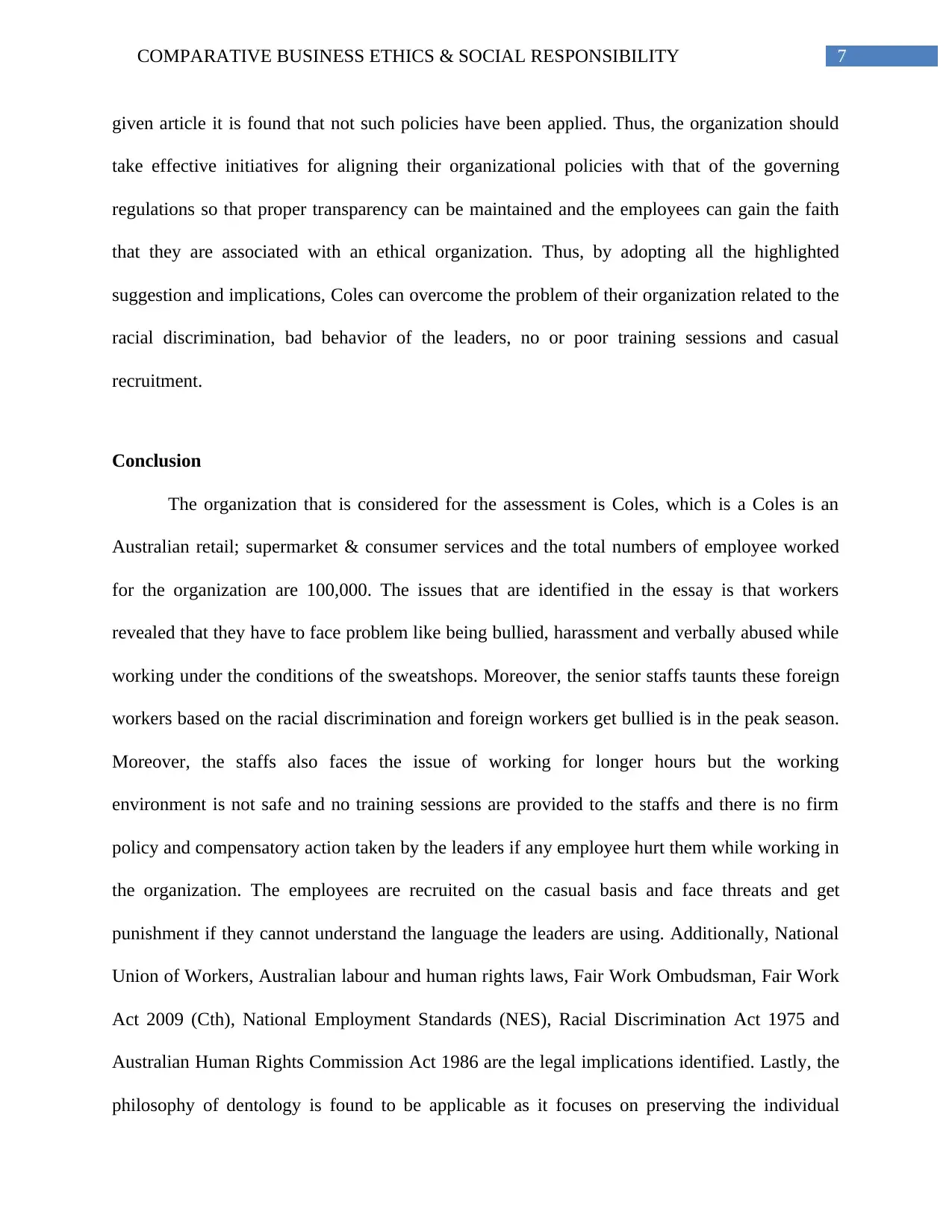
7COMPARATIVE BUSINESS ETHICS & SOCIAL RESPONSIBILITY
given article it is found that not such policies have been applied. Thus, the organization should
take effective initiatives for aligning their organizational policies with that of the governing
regulations so that proper transparency can be maintained and the employees can gain the faith
that they are associated with an ethical organization. Thus, by adopting all the highlighted
suggestion and implications, Coles can overcome the problem of their organization related to the
racial discrimination, bad behavior of the leaders, no or poor training sessions and casual
recruitment.
Conclusion
The organization that is considered for the assessment is Coles, which is a Coles is an
Australian retail; supermarket & consumer services and the total numbers of employee worked
for the organization are 100,000. The issues that are identified in the essay is that workers
revealed that they have to face problem like being bullied, harassment and verbally abused while
working under the conditions of the sweatshops. Moreover, the senior staffs taunts these foreign
workers based on the racial discrimination and foreign workers get bullied is in the peak season.
Moreover, the staffs also faces the issue of working for longer hours but the working
environment is not safe and no training sessions are provided to the staffs and there is no firm
policy and compensatory action taken by the leaders if any employee hurt them while working in
the organization. The employees are recruited on the casual basis and face threats and get
punishment if they cannot understand the language the leaders are using. Additionally, National
Union of Workers, Australian labour and human rights laws, Fair Work Ombudsman, Fair Work
Act 2009 (Cth), National Employment Standards (NES), Racial Discrimination Act 1975 and
Australian Human Rights Commission Act 1986 are the legal implications identified. Lastly, the
philosophy of dentology is found to be applicable as it focuses on preserving the individual
given article it is found that not such policies have been applied. Thus, the organization should
take effective initiatives for aligning their organizational policies with that of the governing
regulations so that proper transparency can be maintained and the employees can gain the faith
that they are associated with an ethical organization. Thus, by adopting all the highlighted
suggestion and implications, Coles can overcome the problem of their organization related to the
racial discrimination, bad behavior of the leaders, no or poor training sessions and casual
recruitment.
Conclusion
The organization that is considered for the assessment is Coles, which is a Coles is an
Australian retail; supermarket & consumer services and the total numbers of employee worked
for the organization are 100,000. The issues that are identified in the essay is that workers
revealed that they have to face problem like being bullied, harassment and verbally abused while
working under the conditions of the sweatshops. Moreover, the senior staffs taunts these foreign
workers based on the racial discrimination and foreign workers get bullied is in the peak season.
Moreover, the staffs also faces the issue of working for longer hours but the working
environment is not safe and no training sessions are provided to the staffs and there is no firm
policy and compensatory action taken by the leaders if any employee hurt them while working in
the organization. The employees are recruited on the casual basis and face threats and get
punishment if they cannot understand the language the leaders are using. Additionally, National
Union of Workers, Australian labour and human rights laws, Fair Work Ombudsman, Fair Work
Act 2009 (Cth), National Employment Standards (NES), Racial Discrimination Act 1975 and
Australian Human Rights Commission Act 1986 are the legal implications identified. Lastly, the
philosophy of dentology is found to be applicable as it focuses on preserving the individual
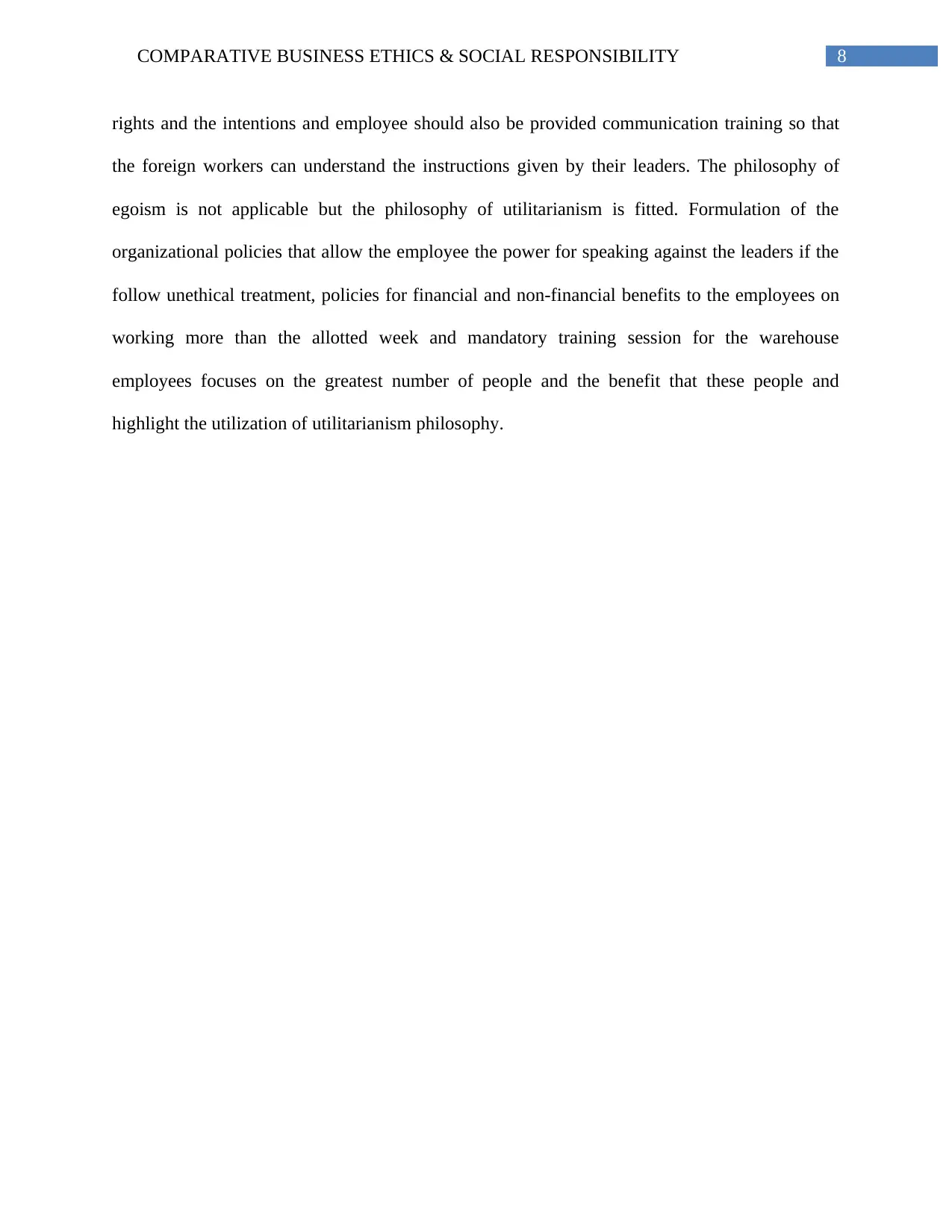
8COMPARATIVE BUSINESS ETHICS & SOCIAL RESPONSIBILITY
rights and the intentions and employee should also be provided communication training so that
the foreign workers can understand the instructions given by their leaders. The philosophy of
egoism is not applicable but the philosophy of utilitarianism is fitted. Formulation of the
organizational policies that allow the employee the power for speaking against the leaders if the
follow unethical treatment, policies for financial and non-financial benefits to the employees on
working more than the allotted week and mandatory training session for the warehouse
employees focuses on the greatest number of people and the benefit that these people and
highlight the utilization of utilitarianism philosophy.
rights and the intentions and employee should also be provided communication training so that
the foreign workers can understand the instructions given by their leaders. The philosophy of
egoism is not applicable but the philosophy of utilitarianism is fitted. Formulation of the
organizational policies that allow the employee the power for speaking against the leaders if the
follow unethical treatment, policies for financial and non-financial benefits to the employees on
working more than the allotted week and mandatory training session for the warehouse
employees focuses on the greatest number of people and the benefit that these people and
highlight the utilization of utilitarianism philosophy.
⊘ This is a preview!⊘
Do you want full access?
Subscribe today to unlock all pages.

Trusted by 1+ million students worldwide
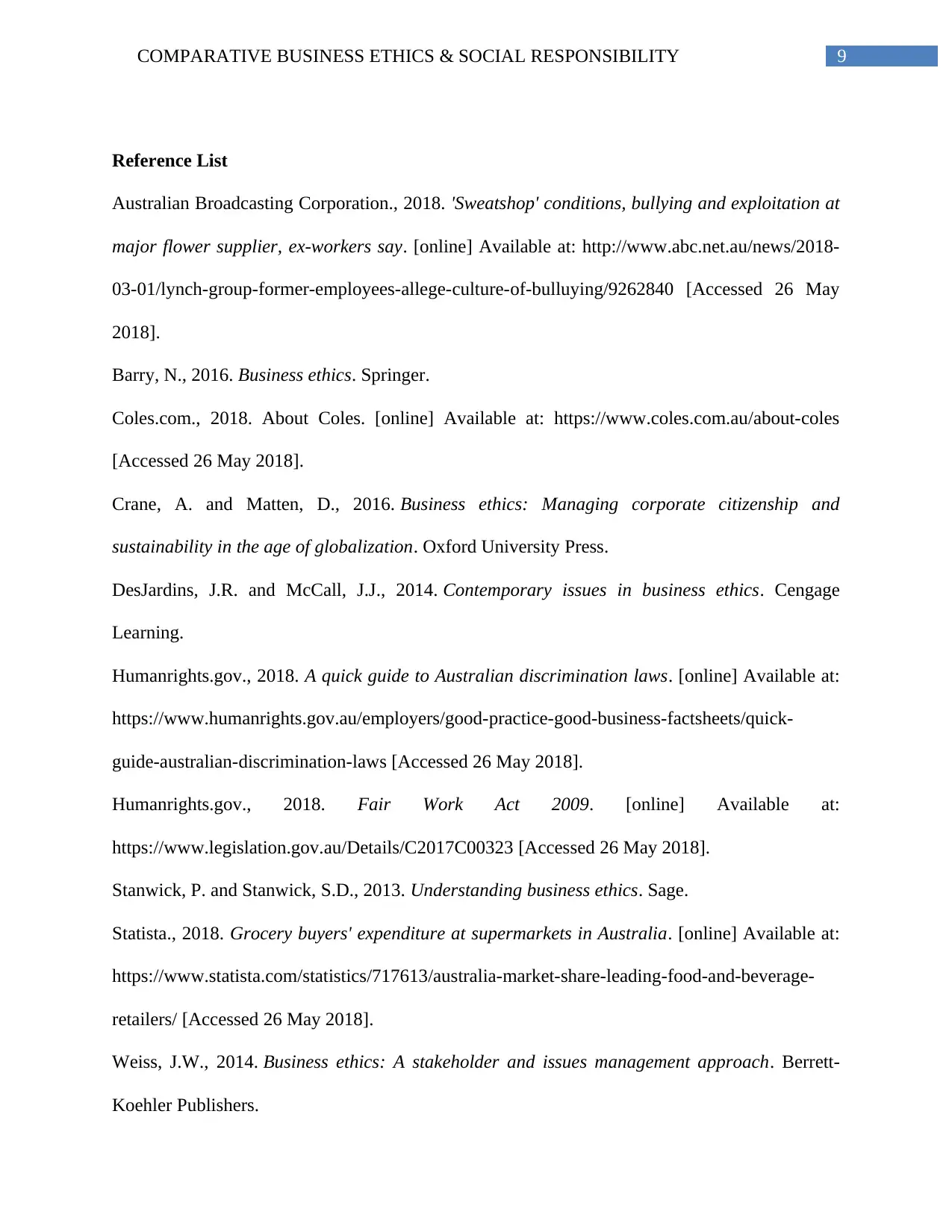
9COMPARATIVE BUSINESS ETHICS & SOCIAL RESPONSIBILITY
Reference List
Australian Broadcasting Corporation., 2018. 'Sweatshop' conditions, bullying and exploitation at
major flower supplier, ex-workers say. [online] Available at: http://www.abc.net.au/news/2018-
03-01/lynch-group-former-employees-allege-culture-of-bulluying/9262840 [Accessed 26 May
2018].
Barry, N., 2016. Business ethics. Springer.
Coles.com., 2018. About Coles. [online] Available at: https://www.coles.com.au/about-coles
[Accessed 26 May 2018].
Crane, A. and Matten, D., 2016. Business ethics: Managing corporate citizenship and
sustainability in the age of globalization. Oxford University Press.
DesJardins, J.R. and McCall, J.J., 2014. Contemporary issues in business ethics. Cengage
Learning.
Humanrights.gov., 2018. A quick guide to Australian discrimination laws. [online] Available at:
https://www.humanrights.gov.au/employers/good-practice-good-business-factsheets/quick-
guide-australian-discrimination-laws [Accessed 26 May 2018].
Humanrights.gov., 2018. Fair Work Act 2009. [online] Available at:
https://www.legislation.gov.au/Details/C2017C00323 [Accessed 26 May 2018].
Stanwick, P. and Stanwick, S.D., 2013. Understanding business ethics. Sage.
Statista., 2018. Grocery buyers' expenditure at supermarkets in Australia. [online] Available at:
https://www.statista.com/statistics/717613/australia-market-share-leading-food-and-beverage-
retailers/ [Accessed 26 May 2018].
Weiss, J.W., 2014. Business ethics: A stakeholder and issues management approach. Berrett-
Koehler Publishers.
Reference List
Australian Broadcasting Corporation., 2018. 'Sweatshop' conditions, bullying and exploitation at
major flower supplier, ex-workers say. [online] Available at: http://www.abc.net.au/news/2018-
03-01/lynch-group-former-employees-allege-culture-of-bulluying/9262840 [Accessed 26 May
2018].
Barry, N., 2016. Business ethics. Springer.
Coles.com., 2018. About Coles. [online] Available at: https://www.coles.com.au/about-coles
[Accessed 26 May 2018].
Crane, A. and Matten, D., 2016. Business ethics: Managing corporate citizenship and
sustainability in the age of globalization. Oxford University Press.
DesJardins, J.R. and McCall, J.J., 2014. Contemporary issues in business ethics. Cengage
Learning.
Humanrights.gov., 2018. A quick guide to Australian discrimination laws. [online] Available at:
https://www.humanrights.gov.au/employers/good-practice-good-business-factsheets/quick-
guide-australian-discrimination-laws [Accessed 26 May 2018].
Humanrights.gov., 2018. Fair Work Act 2009. [online] Available at:
https://www.legislation.gov.au/Details/C2017C00323 [Accessed 26 May 2018].
Stanwick, P. and Stanwick, S.D., 2013. Understanding business ethics. Sage.
Statista., 2018. Grocery buyers' expenditure at supermarkets in Australia. [online] Available at:
https://www.statista.com/statistics/717613/australia-market-share-leading-food-and-beverage-
retailers/ [Accessed 26 May 2018].
Weiss, J.W., 2014. Business ethics: A stakeholder and issues management approach. Berrett-
Koehler Publishers.
1 out of 10
Related Documents
Your All-in-One AI-Powered Toolkit for Academic Success.
+13062052269
info@desklib.com
Available 24*7 on WhatsApp / Email
![[object Object]](/_next/static/media/star-bottom.7253800d.svg)
Unlock your academic potential
Copyright © 2020–2026 A2Z Services. All Rights Reserved. Developed and managed by ZUCOL.




